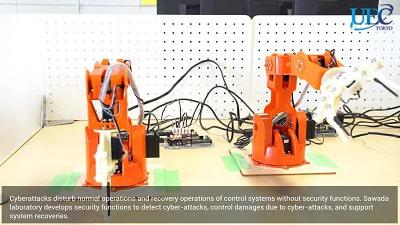December 2019 Issue
Topics
Algorithms for enhancing security of IoT industrial control systems

Kenji Sawada
Associate Professor, Info-Powered Energy System Research Center, The University of Electro-Communications, Tokyo.
Kenji Sawada is using his expertise in control engineering to develop algorithms for freely moving objects for applications including automobiles, robots, and security and energy, using mathematical theory for optimization and signal processing.
"We are developing technology for protecting industrial equipment control systems and critical infrastructure from cyber-attacks, especially in Internet of Things (IoT) related technology," says Sawada. "Unlike information systems, control systems generally have a long operating period of 20-30 years and have limitations in that they cannot be easily shut down if attacked."
Sawada has developed an algorithm that gives security functions to industrial controllers that operate control systems equipped with actuators and sensors. The behavior of controllers is constantly monitored, and a warning can be issued in real time if it deviates from normal operation. This makes it possible to quickly detect abnormalities caused by cyber attacks. Sawada has implemented his technology in FA (factory automation) and PA (process automation) equipment and demonstrated its functions.
However, there have been reports of cyber-attacks targeting important infrastructure such as electricity, gas, and water, underscoring the need for measures to handle such issues.
"I am participating in a national project to develop technology to defend control systems against such attacks, and keep equipment running even under attack," explains Sawada. "It will be implemented in critical infrastructure supporting the facilities of the 2020 Tokyo Olympic and Paralympic Games."
In the field of energy, Sawada is conducting research on energy systems with high so-called resilience (resilient power) aimed at early restoring systems in the event of disasters such as earthquakes and floods. "We are exploring optimal control methods for power systems using autonomous distributed control methods that distribute and autonomously process control systems connected to networks," says Sawada.
Important research papers
- A. Mochizuki et al, "On Experimental Verification of Model Based White list for PLC Anomaly Detection", 2017 Asian Control Conference - ASCC 2017, Gold Coast 17 - 20 December 2017.
Abstract
Recently, defensive countermeasures of controller are important because cyber-attacks on the control system are growing highly. This paper proposes an anomaly detection method of white list using PLC (Programmable Logic Controller) as one of the countermeasures of controller. This paper introduces a white list design technique which models normal behaviors of field devices via Petri net and converts the white list model to ladder diagram. It allows PLC to detect the cyber-attack. - K. Hata et al, "Collaborative Model-Based Fallback Control for Secured Networked Control Systems", IECON 2018 - 44th Annual Conference of the IEEE Industrial Electronics Society
DOI: 10.1109/IECON.2018.8592923Abstract
The authors have proposed the Fallback Control System (FCS) as a countermeasure after cyber-attacks happen in Industrial Control Systems (ICSs). For increased robustness against cyber-attacks, introducing multiple countermeasures is desirable. Then, an appropriate collaboration is essential. This paper introduces two FCSs in ICS: field network signal is driven FCS and analog signal driven FCS. This paper also implements a collaborative FCS by a collaboration function of the two FCSs. The collaboration function is that the analog signal driven FCS estimates the state of the other FCS. The collaborative FCS decides the countermeasure based on the result of the estimation after cyber-attacks happen. Finally, we show practical experiment results to analyze the effectiveness of the proposed method.



